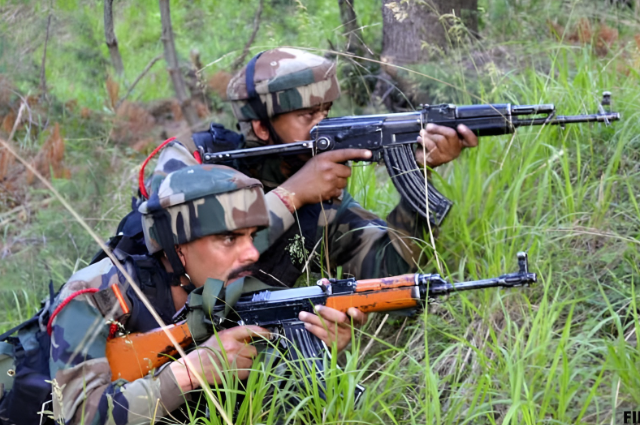In a significant development regarding regional security, India's Home Minister Amit Shah announced that three suspected militants, believed to be responsible for a devastating attack on tourists in Kashmir's Pahalgam area during April, have been eliminated in a coordinated security operation. The original incident, which occurred on April 22 in the Baisaran area near Pahalgam, resulted in the tragic deaths of 26 individuals, predominantly Hindu pilgrims and tourists visiting the scenic region.
The attack sent shockwaves through the tourism industry in Kashmir and raised serious questions about security arrangements for visitors to the disputed territory. The victims were reportedly separated based on gender and religious identity, with survivors recounting that the attackers forced some individuals to recite Islamic prayers before the killings commenced.
Security Response and Operation Details: Joint Military Action
The elimination of the three suspects was achieved through a coordinated operation involving multiple security agencies. The joint mission included personnel from the Indian Army, paramilitary forces, and local police units working in co-ordination. This multi-agency approach demonstrates the serious nature with which Indian security establishments viewed the threat posed by these individuals.
The operation was conducted in the mountainous terrain of Dachigam, located approximately 30 kilometers from Srinagar, Kashmir's summer capital. The challenging geographical location suggests that the suspects had taken refuge in difficult terrain, possibly attempting to evade capture by utilising the natural defensive advantages of the mountainous landscape.
Intelligence and Evidence Gathering
According to Home Minister Shah's parliamentary address, Indian intelligence agencies had compiled substantial evidence linking the three eliminated suspects directly to the Pahalgam attack. This evidence collection appears to have been crucial in tracking down the perpetrators and building a comprehensive case against them. The minister's confidence in presenting this information to Parliament indicates the thoroughness of the investigation conducted by security agencies.
International Dimensions and Cross-Border Tensions
The Home Minister's revelation that all three eliminated suspects were Pakistani nationals has significant implications for India-Pakistan relations. Shah specifically identified two of the deceased as members of Lashkar-e-Taiba, a Pakistan-based militant organisation that has been involved in numerous attacks in the Kashmir region over the years.
India's accusation that Pakistan provided backing to the attackers was vehemently denied by Islamabad, creating a diplomatic standoff between the two nuclear-armed neighbours. This denial and counter-accusation pattern has become a familiar feature of India-Pakistan relations, particularly when cross-border terrorism incidents occur.
Military Escalation and Regional Consequences
The aftermath of the Pahalgam attack led to an intense four-day military confrontation between India and Pakistan in May. This escalation resulted in casualties exceeding 70 people on both sides, highlighting how quickly localised terrorist incidents can spiral into broader regional conflicts. The military engagement underscores the volatile nature of the Kashmir dispute and its potential to trigger larger confrontations.
Security Strategy and Prevention Measures: Immediate Response Protocol
Following the April attack, Shah revealed that emergency security meetings were convened to formulate an appropriate response strategy. A crucial decision emerged from these deliberations that the attackers would not be permitted to escape back to Pakistan. This policy decision reflects India's determination to pursue perpetrators of terrorist attacks rather than allowing them to find sanctuary across international borders.
The success of this strategy, as demonstrated by the eventual elimination of all three suspects, sends a strong message about India's resolve to pursue those responsible for attacks on civilians and tourists in Kashmir.
Long-term Security Implications
The operation's success may serve as a deterrent to future attacks while also demonstrating the improved coordination between various security agencies operating in Kashmir. However, the incident also highlights the ongoing security challenges faced in the region, particularly regarding the protection of tourists and civilians.
The attack initially drew a claim of responsibility from The Resistance Front (TRF), another armed group operating in the region. However, as public criticism intensified over the targeting of innocent tourists, the organisation retracted its claim. This retraction suggests either internal disagreement within the group about targeting civilians or a calculated attempt to distance themselves from an unpopular attack.
International Terrorist Designations
The United States government's recent designation of TRF as a "foreign terrorist organization" adds an international dimension to regional security concerns. This designation typically results in asset freezes, travel restrictions, and enhanced scrutiny of the organization's activities and affiliates.
Historical Context and Ongoing Dispute: Kashmir Conflict Legacy
The Kashmir region has remained a source of tension between India and Pakistan since both nations gained independence from British colonial rule in 1947. The Muslim-majority region's division between the two countries has been a persistent source of conflict, resulting in multiple wars and numerous smaller confrontations over territorial control.
Both nations maintain claims over the entire Kashmir region while controlling different portions of it. This fundamental disagreement continues to influence regional politics, security policies, and international relations in South Asia.
Impact on Civilian Population
The recent incident and subsequent military operations underscore how the broader Kashmir dispute continues to affect civilian populations, including tourists who visit the region for its natural beauty and cultural significance. The targeting of tourists represents a particularly troubling development, as it threatens to undermine one of Kashmir's key economic sectors.
Regional Security and Future Outlook
The successful elimination of the Pahalgam attack perpetrators represents a tactical victory for Indian security forces, demonstrating their capability to track down and neutralise terrorist threats in challenging terrain. However, the incident also serves as a reminder of the complex security environment in Kashmir and the potential for local incidents to escalate into broader regional confrontations.
The international community's attention to groups like TRF, as evidenced by the US terrorist designation, suggests growing global awareness of regional security challenges. Moving forward, the focus will likely remain on preventing similar attacks while managing the gentle balance between security operations and the protection of civilian populations, including the vital tourism sector that many Kashmiris depend upon for their livelihoods.
. . .
References:

